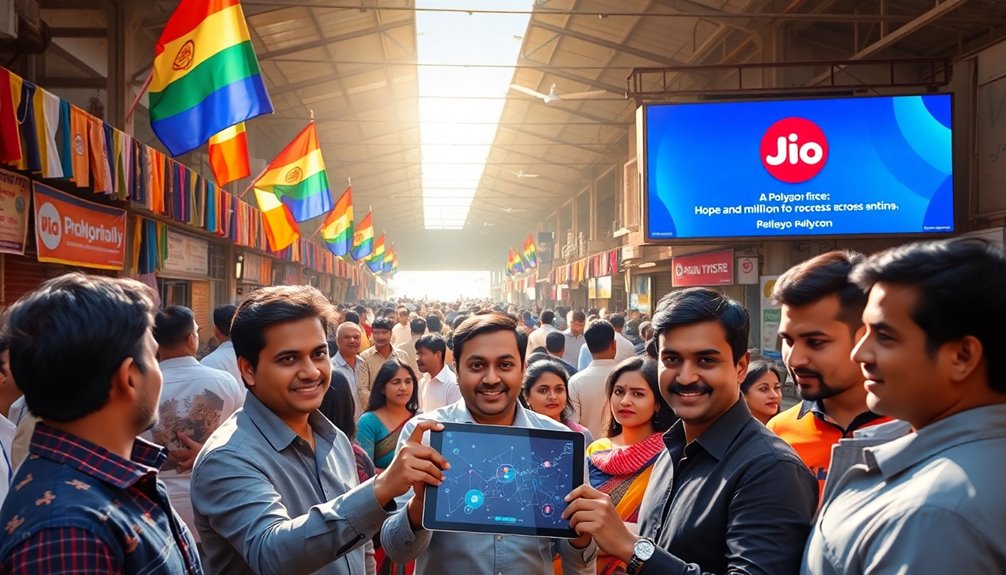Reliance Jio's collaboration with Polygon is set to transform digital transactions for 450 million users in India by harnessing blockchain technology. With JioSphere acting as a gateway, you can expect faster, low-cost payment options, especially reaching rural communities. This partnership aims to enhance user engagement and nurture a vibrant ecosystem for the 93 million crypto owners. As market participation in cryptocurrencies grows, the blockchain landscape is becoming crucial for secure and transparent transactions. Curious about the potential impact on your digital experience? There's much more to uncover about this exciting development.
Key Takeaways
- Reliance Jio integrates Polygon's scalable blockchain technology to enhance digital transactions for a user base of 450 million.
- JioSphere, with over 10 million installs, acts as a gateway for decentralized applications, boosting user engagement.
- The collaboration aims to provide faster and low-cost payment options, particularly benefiting rural users in India.
- This partnership is part of a broader goal to create a vibrant ecosystem for 93 million crypto owners, fostering trust and transparency.
- Reliance Jio and Polygon Labs are focused on delivering innovative Web3 solutions to enhance the digital landscape for Indian users.
Blockchain for Millions in India

As Reliance Jio integrates blockchain solutions for its massive user base, millions in India are set to experience a revolution in digital transactions. By leveraging Polygon's scalable blockchain technology, Jio is transforming how you engage with digital services. You'll enjoy enhanced, personalized, and secure transactions while using JioSphere, their web browser with over 10 million installs, as your gateway to decentralized applications. This integration promises faster, low-cost payment options, especially beneficial for users in rural and semi-urban areas. With 93 million crypto owners onboard, Reliance Jio isn't just adopting blockchain but creating a vibrant ecosystem that fosters trust, transparency, and innovation, paving the way for a future where digital transactions are seamless and efficient for everyone in India.
Regulatory Changes Impacting Blockchain

While blockchain technology holds immense potential for transforming digital transactions, the regulatory landscape in India presents significant challenges.
There's currently no dedicated law governing blockchain and distributed ledger technology, leaving many uncertainties. The proposed "Banning of Cryptocurrency and Regulation of Official Digital Currency Bill, 2019" aims to prohibit various cryptocurrency activities.
Although the Supreme Court struck down the Reserve Bank of India's ban on crypto trading, regulatory pressures remain. Exchanges face compliance issues, particularly concerning Anti-Money Laundering regulations, causing some, like Bybit, to halt operations. Registration with the FIU is crucial for regulatory compliance in India, as demonstrated by exchanges like Binance and KuCoin.
Moreover, navigating licensing requirements complicates things further. As a user, you should stay informed about these regulatory changes, as they significantly affect your access and experience in the blockchain ecosystem.
User Growth and Investment Patterns

The evolving regulatory landscape in India hasn't deterred the growth of blockchain users and investment patterns globally. By 2025, over 420 million people are expected to engage in cryptocurrency, while blockchain wallets exceeded 83.4 million by mid-2022. With the market projected to reach $1.4 trillion by 2030, venture capital funding fuels this surge, particularly in sectors like finance and healthcare, which hold 46% of market share. More than 76% of financial executives foresee digital assets as viable alternatives to fiat currencies soon. Furthermore, the global spending on blockchain solutions is expected to reach $19 billion by 2025(19 billion). As Reliance Jio integrates blockchain for its 450 million users, you'll likely witness enhanced digital experiences. The rapid adoption in the Asia Pacific further underscores a vibrant future for blockchain technology.
Corporate Blockchain Partnerships

Corporate blockchain partnerships are rapidly reshaping various industries, leveraging shared expertise to drive innovation and efficiency. Companies like Ripple and Santander enhance global transfers, while FinClusive, chegd, and Verida focus on compliant KYC and KYB solutions.
Polygon's collaboration with Fidelity connects institutional clients to cryptocurrency trading, exemplifying the financial sector's integration of blockchain. Meanwhile, Reliance Jio and Polygon Labs aim to deliver Web3 solutions to over 450 million users in India. Fifty companies are already utilizing blockchain technology across diverse applications, highlighting the growing interest in this transformative technology.
In healthcare, IBM and the CDC develop encrypted systems for Electronic Health Records. These strategic alliances illustrate how businesses across sectors are utilizing blockchain to streamline operations, enhance security, and improve customer experiences, setting the stage for a more connected and efficient future.
Elections Driving Blockchain Adoption

Blockchain technology is gaining traction beyond corporate partnerships, particularly in the realm of elections.
Online voting systems, like Voatz's blockchain-based platform, can increase voter engagement by allowing you to cast your ballot from anywhere with internet access. This not only boosts turnout but also ensures verified votes, reducing the risk of miscounting. Moreover, the use of smart contracts in these systems can automate the verification process, further enhancing security.
You'll appreciate the transparency, as you can check your vote on the blockchain, enhancing trust in the process.
As cryptocurrency policies gain influence, candidates focusing on crypto may attract more support from voters like you—over 16% identify as part of the Crypto Voting Bloc.
Ultimately, regulatory decisions will shape how blockchain technology transforms electoral participation and engagement in the near future.
Emerging Blockchain Use Cases

As organizations explore innovative solutions, emerging blockchain use cases are reshaping various industries.
In energy, platforms like Vakt streamline trade settlements, while Powerledger enables peer-to-peer energy trading, enhancing efficiency and lowering costs. Blockchain technology supports efficient energy trading platforms and promotes transparency in energy transactions.
Real estate benefits from tokenization, allowing fractional ownership and secure transactions through smart contracts, which reduce paperwork.
In education, blockchain secures academic credentials, making verification quick and fraud-proof.
Supply chains leverage blockchain for end-to-end traceability and real-time inventory tracking, cutting costs by minimizing paperwork.
Lastly, in media and entertainment, blockchain combats content piracy, ensuring creators are compensated fairly.
Embracing these use cases, you can unlock a more efficient, transparent, and trustworthy landscape across multiple sectors.
Frequently Asked Questions
How Will This Partnership Affect Existing Blockchain Projects in India?
This partnership will likely enhance existing blockchain projects in India by providing greater scalability and accessibility.
You'll notice improved integration of blockchain capabilities in various applications, making it easier for users to engage with the technology.
As new use cases emerge, like decentralized finance and NFT platforms, you'll see a boost in innovation.
This collaboration could also stimulate growth in the crypto market, offering small businesses fresh opportunities to adopt blockchain solutions.
What Security Measures Are in Place for User Data?
When it comes to security measures for user data, you'll find several critical practices in place.
Data protection and privacy assessments ensure your rights are safeguarded. Encrypted communication channels and multi-factor authentication protect your access.
Regular smart contract audits identify vulnerabilities, while user education helps you avoid phishing attacks.
Additionally, decentralized governance and identity verification systems enhance transparency, ensuring you can trust the security of the blockchain environment you engage with.
Will There Be Any Costs for Users Accessing These Blockchain Services?
When accessing blockchain services, you won't face significant costs. Transaction fees are minimal and often lower than traditional systems, and in some cases, they might even be free.
Data storage on the blockchain is typically low-cost, ensuring you have secure and decentralized control over your information.
Plus, integrating these services with existing applications won't incur additional charges, making it easier for you to enjoy the benefits without worrying about extra fees.
How Can Users Get Involved in This Blockchain Initiative?
Getting involved in this blockchain initiative is like stepping onto a new digital frontier. You can dive into community-building on the blockchain, explore NFT marketplaces, or utilize innovative payment systems.
What Are the Long-Term Goals of This Partnership?
The long-term goals of this partnership focus on enhancing your digital experience.
You'll gain more personalized control over your data and enjoy seamless integration across various applications.
Expect real-time functionalities like instant payments and smooth video streaming.
The partnership aims to ensure scalability and speed, allowing thousands of transactions per second.
Additionally, it promotes decentralized data ownership, giving you greater control over your digital assets and fostering community engagement.
Conclusion
In conclusion, the partnership between Polygon and Reliance Jio is set to revolutionize blockchain access for millions in India. With regulatory changes and corporate collaborations paving the way, you'll likely see innovative use cases emerge. For instance, imagine a local farmer using blockchain to securely sell produce directly to consumers, cutting out middlemen. This not only boosts their income but also enhances transparency in the supply chain. The future of blockchain is bright, and you won't want to miss it!
Thorsten has been immersed in the cryptocurrency world for several years. His early experiences as a miner and active market participant have given him first-hand knowledge of the industry’s highs and lows. Thorsten’s approach is grounded in transparency and honesty, ensuring our editorial direction remains authentic, accurate, and reader-focused.










